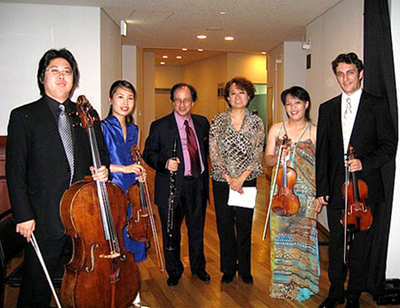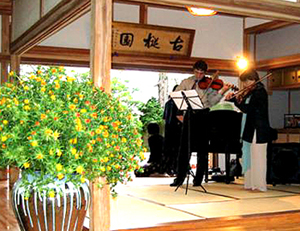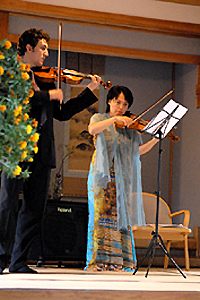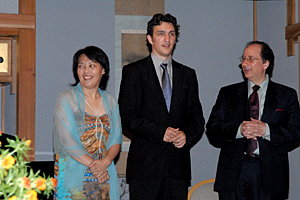The Summer 2007 Japan
My children are in the first year of junior high school and fifth grade of elementary school. Taking them everywhere is getting difficult, as school life has become more important for them. School life in Brussels is their society, and sacrificing that to come with me has worn thin with them.
On the other hand, summer holiday in Europe is full two months without homework. So thinking to myself"Somehow, I'd really like to live the Japan life", I took the opportunity to bring them back to Japan for about a month. It gives me peace of mind. I enjoy everyday life in Japan, which is different from coming back for a concert tour.
At the beginning they rattle on in French, but after two or three weeks, they throw off jet lag and start speaking Japanese. Their questions become focused.
"What does Hanpajyanai (powerful and decisive) mean?"
"・・・"
In the past I was astounded many times finding that I was trying to bring up my children without being capable of conveying subtle nuances to them. Then I thought"if I don't get them to use Japanese...". But, as I wrote before, language is all-or-nothing and one cannot comfortably live with multiple languages. For conversations one may benefit from knowing many languages, but one language is quite sufficient when it comes to ヤthink'. This is the reason why I have given up teaching Japanese to them in Brussels, and it means the clear decision has been made.
So, this year, off to Yamagata as usual.
Last year, I performed with my husband who conducted Yamagata Symphony Orchestra. The main program was Lalo's Symphonie Espanole. The concert commemorated the 110th anniversary of the founding of Yamagata Bank and audience was invited for free. I played"Spanish" to my heart's content at the full Terrsa Hall.
Last December, I performed a recital with Jean-Marc Luisada at the Terrsa Hall again, while NHK was recording it for TV. Since it was a public recording, everybody was invited on applications.
This time the concert was"for business". It's kind of a test to see how many people would actually pay for a ticket for my concert.
This concert, named" the pleasure of chamber music" was sponsored by the Yamagata Bank, and organized by the Yamagata Broadcasting and the Yamagata Daily. I was asked to produce the program for this concert at my discretion.
When I was a student, I devoted my time to chamber music. At the universitiy's cultural festival, I constructed a room named"Gakutaiya (an orchestra shop)", and indulged in the"festival", refusing violin lessons. There must have been few to do such a thing.
The great thing about chamber music is that the repertoire is fascinating. Composers reveal their inner feelings, colors, and thoughts, which they cannot express in a concerto or sonata.
Chamber music is the basis of music. Interpersonal complexity turns into fun.
This time, my friend Charles Neidich agreed to join in this concert. When it comes to clarinetist, I think he is the best in the world! So I planned a program of chamber masterpieces including clarinet. The first was our old friend, Beethoven's Spring Sonata. Arimori Naoki plays the piano. Later I learned that he was raised in Yamagata until he was 12.
Although Beethoven's Spring somehow evokes the feeling of somewhat tender sounds, this piece has profound contents such as firm structure, strength, deepness and the third and fourth movements where wind blows.
The second program is Bartok's Contrast. This piece is for clarinet, violin and piano. This is written for Szigeti as violinist, Benny Goodmann as clarinet player and Bartok himself as pianist. This piece is a quite interesting one including many things such as Hungarian folk songs, peasant dances, American jazz, cadenza for clarinet, cadenza for violin ....
As an introduction to these pieces:Bartok's Duo for Two Violins. Part of the reason is to let my student have the credit. He is Marcel Andriesii, who is visiting Japan for the first time.
He also played the second violin in the Mozart' Clarinet Quintet in the latter half of the concert. Other members are Tsujimoto Rei, a cellist, and Akasaka Tomoko, a viola player. Both are promising young people. There are many who can coordinate timing, but there are few who can coordinate tone. I look forward to enjoying them in the future.
The concerts finished with this masterpiece of masterpieces. Luxurious and gorgeous! I am proud of myself in putting together this program, which was the"core" of chamber music.
Although half a concert's success or failure depends on the program, the rest depends, no matter what, something that can't be known in advance. You have to hear the sound.
We practiced intensely for two days at my home. My mother, in the kitchen, was very much pleased to hear our practice. In retrospect, at the time of the Toho's cultural festival, my home was always the place people got together. Our practice seemed to remind her of those joyful memories. I did unexpected filial devotion to my mother!
Everybody showed good sense. Charlie, while enjoying himself, gave precise instructions. It was not the role to say,"whatever you want to". He could do this because he had knowledge about everything, heart, and technique to express all these things.
In the past, I asked him how to use the violin bow. Even in pieces with no clarinet part, his advice ("Here, down. Now, here, up would be good...) was just right.
The first day of the concert was held at the Kitagami Sakura Hall. The hall is superb. The wooden work, interior decoration, and wave shaped seats are excellent, and above all, the hall acoustics are outstanding. The stage sound goes directly to the audience without change. We were able to play at ease, without any worry about balance.
Although we performed together for the first time, Oshima Fumiko, my old friend and now Mrs. Charles Neidich, praised our performance as"an excellent one to the extent rarely experienced."
The next day, to Yamagata. The performance at the Terrsa Hall. On the way, an idea struck me to introduce a commentary on the music during the concert. However, doing it myself seemed too troublesome and depressing, because I would have to do listening, answering, and interpreting, on top of performing. One hour before the performance, I asked Fumiko to do this on behalf of me, and she accepted instantly. Very reliable person she was.
In such a way, she acted as an interpreter, emcee and so on. Charlie explained how the Contrast was composed, why this piece could be played by two clarinets, two violins and a piano etc. He charmed the whole audience and me with his learning and attractive talk.
Charles Neidick is not an ordinary person.
I mentioned a person who majored in two subjects in my essay"The Students' Graduation" in an ealier yuzunote.
He majored in anthropology at Yale University while studying clarinet, though not at music school. He went to study to Moscow in the old Soviet Union as one of the first Americans. He won the Munich International Competition and the Naunburg Competition. That was the way he has built his career. Recently he has become interested in the so-called"Period Technique", and has been recreating old instruments, music and playing techniques, which were used at the time of Mozart and Brahms. His good musical sense enables him to perform freely and naturally, surpassing the"priggish" of performance which we often find in this type of approach. While co-performing Mozart's Clarinet Quintet, his free and easy performance made me giddy.
Thinking about these things, when I see him over a music stand and he is smiling in his eyes...Hat's off to him!

On the third day, we performed at the ex-Horigome house in my hometown. Now the house is called Benihana Museum and is maintained by the town. When I was a child, we spent summer holidays here, in the country where my father was brought up. I spent such a rich time, practicing the violin in a storehouse, playing in a nearby river, and being afraid of use of the outside toilet at night.
Last year, we gave a mini-concert when I came here to pay respects at my ancestor's graves, and the concert was well received. We decided to do it again. The noise of cicada was so great that I have given my personal to the concert as"the cicada chorus concert".
Everyone in Kahoku town had prepared everything very well. Over 200 tickets were already delivered. Chairs were arranged instead of the tatami-mats used last time. In the evening, in the middle of rainy season, it was chilling. It was raining on and off, and I was worried, but a person in charge said"On the contrary, the rain will clean things up," as if the rain was sprinkled water from the heaven.

The cicadas didn't drown things out, but you could hear their sound hear and there. The concert started at 6p.m..

We played the first movement of the Spring Sonata. Then we played Bartok's Duo. Marcel came from Moldavia.
Moldavia is a small country between the Ukraine and Rumania. If you travel Europe toward the east, Moldavia appears after Hungary and Rumania before Ukraina and Russia.
He came to Japan for the first time and visited Benihana museum. He just said"This house is like a place of dreams. This is very special." I will write about him more later.
His homeland neighbouring Transylvania. Bartok's folk music was also inspired by the songs of Marcel's homeland. To my surprise, Charlie performed Zigeunerweisen on the clarinet. There should be no one else to be able to do this in the world. This piece is difficult even for violin. He played it seriously.

Charlie. Ayako. Marcel, My family. My ancestors. The friends from New York. The people from my hometown.
The mixture of people from so many distant places shared music at the house in Kahoku town.
It is a miraculous, once-in-a-lifetime thing, and I am thankful for it.
Talking about once-in-a-lifetime encounter, on this journey I encountered delicious food everyday.
Many musicians are"foodies", and in this passion"Mr&Mrs Charlie" and I, are next to none. However, we cannot always succeed in finding good food.
This time we were very lucky. In Kitagami, we found"hoya" (acidiens, Charlie's favorite), milk-like thick Iwagaki-oyster (very different from those in Belgium), and ainame (greenling fish) sashimi. In Yamagata we enjoyed many dishes at restaurant Cybele, which is famous for rusk. They were"warabi"
(bracken),"dadachamame"(a special kind of green soybeans), various kinds of home cooking, and Yonezawa beef, which was so soft that you could cut it with chopsticks!
On the third day, we had a Japanese traditional course feast, including soba (buckwheat noodles), at Restaurant Azumaya in Kahoku town.
I realized that soba had such wide and deep possibilities for the first time..
With good friends I play music with full strength and concentration.
Then I eat.
There is no need for words.
On the following day, people left one by one. By the evening, everybody had gone.
In fact, I wanted to talk with them sitting on the outer corridor at Beninaha musem once again.
Thinking about these things, I boaded the Shinkansen express train from Tendo station, feeling its comfortable breeze and the sound of wind bells. The tender sun rays and the breeze at dusk...
No matter how you try to send the information... Smell, wind, tastes, touch. These essential things can't be conveyed at all.
A real thing has its own satisfaction and is complete in itself.
Sometimes, in savoring the moment, we take risks.
It was a good trip.
at Tokyo
